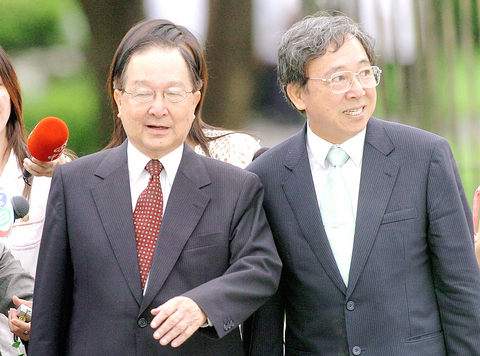Responding to the call from some pan-green academics for him to voluntarily resign, President Chen Shui-bian (陳水扁) yesterday vowed to spend the rest of his term realizing his 2004 campaign platform, including constitutional reform.
"The president appreciates the opinion of the public and will make an effort to put into practice the promises he made in his re-election bid," Presidential Office Secretary-General Mark Chen (
Mark Chen made the remarks after the president met with 11 former advisers at the Taipei Guest House for what turned out to be a three-hour lunch meeting.

PHOTO: CHEN TSE-MING, TAIPEI TIMES
Mark Chen said all 11 advisers told the president that it was not necessary for him to step down because he was elected by the people to serve a four-year term and that he should stay on the job until his term expires.
In a bid to solicit more opinions from the public, Mark Chen said the president will meet with more groups.
Yesterday's meeting came one day after a group of pan-green academics urged the president to seriously consider stepping down because they said he had lost credibility and the people's trust.
Deputy Secretary-General of the Presidential Office Cho Jung-tai (
Wu Li-pei (吳澧培), one of the former senior advisers invited to yesterday's meeting, told the Taipei Times that he did not think President Chen should step down because the president had not done anything illegal.
"Even though his son-in-law was indicted, he is not yet convicted," Wu said. "Even if he is convicted, think about those corrupt officials working for the Chinese Nationalist Party [KMT] government. Shouldn't they all have had to step down if we applied the same standards to them?"
Wu said the pan-blue camp's demand that the president resign because they could safeguard honesty and protect Taiwan was a joke.
"The KMT should reflect on what they have done to safeguard honesty and protect Taiwan over the 50 years they were in power," he said. "Back then, they claimed Taiwan was `free China,' but what they said was a lie because Taiwan was not free and Taiwan was not China."
Before yesterday's meeting, Wu told the Taipei Times that he would advise President Chen to make it clear that he would not resign and to tell the public exactly what he planned to do for the remainder of his term.
Wu said the president must establish a sound mechanism to safeguard national security so the nation could be free from fear.
On the diplomatic front, Wu said that the president must improve communication channels with the US government and work with Washington to achieve common goals and interests.
He said the Executive Yuan's cross-strait economic policy must also conform to the four principles set down by the president -- to increase investment in Taiwan, create more jobs, reduce the urban-rural gap and to narrow the gap between the rich and poor.

The CIA has a message for Chinese government officials worried about their place in Chinese President Xi Jinping’s (習近平) government: Come work with us. The agency released two Mandarin-language videos on social media on Thursday inviting disgruntled officials to contact the CIA. The recruitment videos posted on YouTube and X racked up more than 5 million views combined in their first day. The outreach comes as CIA Director John Ratcliffe has vowed to boost the agency’s use of intelligence from human sources and its focus on China, which has recently targeted US officials with its own espionage operations. The videos are “aimed at

STEADFAST FRIEND: The bills encourage increased Taiwan-US engagement and address China’s distortion of UN Resolution 2758 to isolate Taiwan internationally The Presidential Office yesterday thanked the US House of Representatives for unanimously passing two Taiwan-related bills highlighting its solid support for Taiwan’s democracy and global participation, and for deepening bilateral relations. One of the bills, the Taiwan Assurance Implementation Act, requires the US Department of State to periodically review its guidelines for engagement with Taiwan, and report to the US Congress on the guidelines and plans to lift self-imposed limitations on US-Taiwan engagement. The other bill is the Taiwan International Solidarity Act, which clarifies that UN Resolution 2758 does not address the issue of the representation of Taiwan or its people in

DEFENDING DEMOCRACY: Taiwan shares the same values as those that fought in WWII, and nations must unite to halt the expansion of a new authoritarian bloc, Lai said The government yesterday held a commemoration ceremony for Victory in Europe (V-E) Day, joining the rest of the world for the first time to mark the anniversary of the end of World War II in Europe. Taiwan honoring V-E Day signifies “our growing connections with the international community,” President William Lai (賴清德) said at a reception in Taipei on the 80th anniversary of V-E Day. One of the major lessons of World War II is that “authoritarianism and aggression lead only to slaughter, tragedy and greater inequality,” Lai said. Even more importantly, the war also taught people that “those who cherish peace cannot

US Indo-Pacific Commander Admiral Samuel Paparo on Friday expressed concern over the rate at which China is diversifying its military exercises, the Financial Times (FT) reported on Saturday. “The rates of change on the depth and breadth of their exercises is the one non-linear effect that I’ve seen in the last year that wakes me up at night or keeps me up at night,” Paparo was quoted by FT as saying while attending the annual Sedona Forum at the McCain Institute in Arizona. Paparo also expressed concern over the speed with which China was expanding its military. While the US